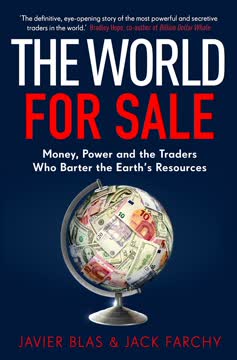Key Takeaways
1. Britain Transformed from Empire to Global Financial Butler
"Britain has lost an empire and has not yet found a role... Britain had lost an empire, but it had already found a role: as an amoral servant of wealth wherever it could be found."
Post-Imperial Reinvention. After losing its global empire, Britain discovered a new economic strategy: becoming a global financial service provider that helps wealthy individuals and corporations hide, move, and protect their money. This transformation was not accidental but a deliberate economic pivot.
Key characteristics of Butler Britain:
- Providing discreet financial services
- Minimizing regulatory scrutiny
- Attracting international wealthy clients
- Prioritizing fees over ethical considerations
Historical context. The shift began in the 1950s, specifically after the Suez Crisis, when Britain needed a new economic model to maintain global relevance and generate revenue in a post-colonial world.
2. Eurodollar Market: The Birth of Offshore Financial Manipulation
"Eurodollars simultaneously were and weren't dollars. They were dollars in the sense that you could use them to buy things, just like you could with ordinary dollars."
Financial Innovation. The Eurodollar market represented a revolutionary financial instrument that existed in a regulatory gray area, allowing banks to circumvent traditional monetary restrictions and create a new form of borderless currency.
Key mechanisms of Eurodollar manipulation:
- Exploiting differences in international financial regulations
- Creating a market outside traditional banking oversight
- Enabling free movement of capital
- Undermining government monetary control
Global impact. This innovation fundamentally transformed international finance, creating a template for future offshore financial strategies that prioritized profit over transparency.
3. British Overseas Territories: Laundering Money and Enabling Criminality
"The BVI is selling discreet and affordable asset protection services, all guaranteed by the pleasant and reassuringly solid presence of the British flag."
Offshore Havens. British territories like the British Virgin Islands (BVI) became sophisticated money laundering and tax avoidance centers, providing shell companies and financial structures that help criminals and corporations hide their wealth.
Systemic enablers:
- Minimal regulatory oversight
- Low-cost company registration
- Complete anonymity for company owners
- Lack of financial transparency
Global consequences. These territories have facilitated billions in stolen funds, supporting kleptocrats, tax dodgers, and criminal networks worldwide while generating significant revenue for themselves.
4. The Gambling Industry: Weaponizing Addiction for Profit
"The people most at risk are the most profitable to the industry; the greater the problem, the bigger the profit."
Regulatory Collapse. Britain's gambling industry transformed from a tightly controlled sector to an aggressive, addiction-driven market after relocating to Gibraltar and creating online platforms.
Addiction mechanics:
- Removing tax barriers
- Creating algorithmically addictive platforms
- Targeting vulnerable populations
- Minimizing regulatory constraints
Societal Impact. The industry has generated massive profits while causing significant social harm, with estimates suggesting 250,000-460,000 problem gamblers and potential links to hundreds of annual suicides.
5. Shell Companies and Limited Partnerships: Vehicles for Global Fraud
"Scottish limited partnerships were without a doubt the most comprehensive – if that's the right word – complicated cybercrime set-up I'd ever seen."
Legal Loopholes. Specific legal structures like Scottish Limited Partnerships (SLPs) were exploited to create almost untraceable financial vehicles for moving and hiding potentially illicit funds.
Systematic vulnerabilities:
- Minimal registration requirements
- Limited ownership transparency
- Ease of international transfer
- Lack of meaningful regulatory oversight
Criminal Exploitation. These structures became sophisticated tools for international fraud, enabling complex money laundering schemes across multiple jurisdictions.
6. Kleptocrats and Oligarchs: Finding Safe Haven in the UK
"Britain integrated him so enthusiastically into the Establishment that he advised the government on Putin's invasion."
Welcoming Questionable Wealth. The UK actively courted and integrated wealthy individuals with dubious backgrounds, offering them social legitimacy, financial services, and political access.
Integration strategies:
- University donations
- Political networking
- Property investments
- Cultural philanthropy
Geopolitical Implications. This approach transformed the UK into a safe harbor for international elites, potentially compromising national security and democratic integrity.
7. Regulatory Failure: A System Designed to Protect Wealthy Clients
"Butler Britain exists to help its clients. It has no interest in stopping them from misbehaving when there's profit in it."
Systemic Dysfunction. Britain's regulatory bodies are structurally incapable of effectively investigating financial crimes, with multiple overlapping and ineffective agencies.
Regulatory weaknesses:
- Fragmented oversight
- Insufficient funding
- Lack of prosecutorial will
- Prioritizing financial services over accountability
Institutional Bias. The system is fundamentally designed to facilitate financial transactions rather than prevent criminal activities.
8. Private Prosecutions: Justice for Sale to the Highest Bidder
"Private prosecutions are far more expensive than those brought by the government... a powerful tool available only to the very wealthy."
Two-Tier Justice System. The UK's legal framework now allows wealthy individuals to effectively purchase judicial proceedings, creating an unequal system of legal recourse.
Prosecution dynamics:
- Minimal financial risk for prosecutors
- Overwhelming legal resources
- Ability to target specific individuals
- Circumvention of public prosecution systems
Ethical Concerns. This approach transforms the judicial system from a public service into a transactional marketplace.
9. The Human Cost of Butler Britain's Business Model
"Butler Britain exists to help its clients. It has no interest in stopping them from misbehaving when there's profit in it."
Global Exploitation. Britain's financial services model directly contributes to systemic poverty, corruption, and economic instability in developing nations.
Destructive Consequences:
- Facilitating large-scale theft
- Undermining democratic institutions
- Protecting kleptocratic networks
- Enabling global economic inequality
Humanitarian Impact. The pursuit of financial profit comes at an enormous human cost, particularly for vulnerable populations in developing countries.
10. A Path Forward: Potential for Systemic Reform
"There are some years when history speeds up, and societies achieve transformations that normally take decades."
Possibility of Change. Despite entrenched systems, there are emerging opportunities and political will to fundamentally restructure Britain's financial services approach.
Reform Strategies:
- Enhanced transparency legislation
- Strengthened international cooperation
- Robust regulatory frameworks
- Prioritizing ethical considerations
Systemic Potential. By recognizing its current model's failures, Britain could transform from a global financial enabler to a leader in ethical financial practices.
Last updated:
FAQ
What's Butler to the World about?
- Britain's Financial Role: The book explores how Britain has become a facilitator for wealthy individuals, including tycoons and criminals, to manage and hide their wealth.
- Historical Context: It traces this role back to the 1950s, highlighting Britain's shift to a global financial hub post-empire.
- Case Studies: Various examples, such as the Suez Crisis and offshore financial centers, illustrate systemic issues in British financial practices.
Why should I read Butler to the World?
- Insightful Analysis: The book offers a critical perspective on Britain's financial practices and their moral implications.
- Relevance to Current Events: It is timely, shedding light on tax havens and financial crime affecting global economies.
- Engaging Writing Style: Oliver Bullough combines thorough research with compelling storytelling, making complex topics accessible.
What are the key takeaways of Butler to the World?
- Britain as an Enabler: The UK is portrayed as a global enabler for financial crime, likened to a butler serving the wealthy.
- Offshore Finance Impact: Offshore systems facilitate tax evasion and money laundering, undermining financial integrity.
- Call for Accountability: The author advocates for transparency and reform in Britain's financial practices.
What are the best quotes from Butler to the World and what do they mean?
- "Britain is like a butler.": This encapsulates the book's thesis, highlighting Britain's role in serving the wealthy.
- "If you sat down to count a hundred billion pounds...": Illustrates the vast scale of money laundering through British systems.
- "The butler’s work is never done.": Suggests the ongoing nature of Britain's role in facilitating financial crime.
How does Butler to the World address the issue of money laundering?
- Systemic Issues: British financial institutions prioritize profit over ethics, creating an environment conducive to money laundering.
- Role of Shell Companies: Scottish limited partnerships are used to obscure identities and evade scrutiny.
- Global Implications: Money laundering contributes to inequality and undermines governance in poorer countries.
What historical events does Butler to the World reference?
- Suez Crisis: Marks the beginning of Britain's shift towards a financial model serving the wealthy.
- Post-War Financial System: Details Britain's adaptation to global dynamics by becoming a financial hub.
- Emergence of Offshore Centers: Explores the rise of offshore centers as a consequence of British policies.
What is the significance of the term "Butler Britain" in Butler to the World?
- Metaphor for Service: "Butler Britain" suggests the country's role in catering to the wealthy.
- Critique of Morality: Highlights the moral ambiguity of Britain's financial practices.
- Call for Change: Serves as a rallying cry for reform and accountability.
How does Butler to the World connect to current global financial issues?
- Relevance to Tax Havens: Discusses the ongoing relevance of tax havens in the global economy.
- Impact of Financial Crime: Connects financial crime to broader societal issues like inequality and corruption.
- Need for Reform: Advocates for systemic reform to address financial regulation and accountability.
What role do offshore territories play in the themes of Butler to the World?
- Facilitators of Financial Crime: Offshore territories provide anonymity and legal frameworks for evasion.
- Economic Impact: These territories become economically dependent on services to wealthy clients.
- Regulatory Challenges: Lack of oversight complicates efforts to combat financial crime.
What are Scottish Limited Partnerships (SLPs) and why are they significant in Butler to the World?
- Definition of SLPs: Business structures in the UK allowing limited liability and minimal transparency.
- Facilitation of Crime: 80% of SLPs are owned by anonymous offshore companies, aiding money laundering.
- Political Response: The rise of SLPs prompted calls for reform, facing challenges from financial interests.
How does Butler to the World critique British identity and values?
- Contradiction of Image vs. Reality: Critiques the gap between Britain's moral image and financial practices.
- Historical Legacy: Connects modern financial practices to Britain's colonial past.
- Call for Reflection: Encourages introspection on British identity in light of financial issues.
What solutions does Butler to the World propose for addressing financial corruption?
- Stricter Regulations: Advocates for comprehensive reforms to enhance transparency.
- Empowering Law Enforcement: Calls for better funding and resources to combat financial crime.
- Public Awareness and Advocacy: Encourages discussions on financial ethics and policy advocacy.
Review Summary
Butler to the World explores how Britain has become a global enabler of financial misconduct since the 1950s. Many reviewers found it eye-opening and well-researched, praising Bullough's engaging writing style and use of case studies. The book examines topics like offshore tax havens, shell companies, and the UK's role in facilitating money laundering. While some readers felt overwhelmed by financial details or found the tone too critical, most appreciated the book's relevance and importance in understanding Britain's current economic landscape.
Similar Books







Download PDF
Download EPUB
.epub digital book format is ideal for reading ebooks on phones, tablets, and e-readers.





